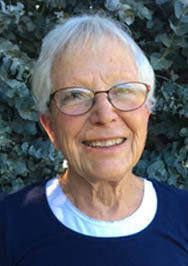“The Biggest Little Farm” has been highly recommended as a must see movie.
So, when part of my farm family was planning to attend, they were kind enough to invite me. Harper and Tatum, ages 8 and 11, with enough popcorn to last through the planting, harvesting, predator balancing and animal birthing of the Moorpark farm, were mesmerized like their parents and grandma.
The next morning Harper and I were picking berries for market and I asked her, “What did you like best about the movie last night?”
“The pig,” she answered without hesitation.
The fact that her sister and cousin had recently raised five hogs for the five months prior to the Healdsburg fair probably influenced her opinion. But, a mother pig is certainly a special creature, birthing all those piglets with such calm and resolution. Those scenes reminded me of the years when our sons invested in at least three producing sows over the years, overseeing the arrivals of dozens of able and instantly hungry, little, squealing creatures.
Do you know that the mother pig will gather the bedding straw in her jaws and place it in a pile, making a big comfy nest just like a bird? How does she know to do that?
We continued to speak about the farm in the movie. Harper then made the following observation.
“Gramma, they didn’t talk about thinning the fruit.”
And I responded, “They didn’t talk about weeding, either.”
We determined that the group of interns whom the farm couple had hired did all that work but it was still odd that that fact wasn’t mentioned.
On most family farms there isn’t money enough to pay hired help or provide lodging for interns. The family farms. That means there are tasks that must be accomplished and it can get pretty intense during spring and summer.
On this family farm there are four grandchildren who have lived either their whole lives, in the case of Lucas and Wilson Kiff; or most of their lives, that is true of the two Minnesota girls, who were less than 1 year and 4 years old when they moved to the farm.
I recall a comment their dad, Tom, made when some of their friends questioned why the girls weren’t going to attend preschool.
His reply: “I tell them they are enrolled at Ridgeview Farm Preschool.”
Some of my favorite memories involve time spent beside the children who lived their early years in the garden and with the few farm animals that we always had. Lucas would patter after Sarah and me, asking questions and upon hearing an answer would fire back, “How do you know?” Twenty years later we still laugh together over that.
“Why did I say that?” asked Lucas.
“I don’t know,” is my honest reply.
Just yesterday, I reminded Wilson, now headed off to college, that I will always remember when he was given the job of chipping excess cement off used bricks and stacking them with the idea of their usefulness in constructing a low wall.
“It never got built!” stated Wilson. “Why did I go to all that trouble to move and stack them?”
Again, “I don’t know.”
Our Oregon grandchildren, all four of them, lived in Davis for much of their childhood, spending holidays and driving over to this farm often for farmers market events like the Pumpkin and Zucchini festivals. They, too, have memories of hunting for Easter eggs in the farm garden and harvesting apples and flowers.
Their own family farm in McMinnville continues to be a source of shared work when the vineyard yields its crop of Pinot Noir and everyone helps from sorting through the grape bunches to drawing wine labels and managing the winery’s website.
I believe it is in every one of us to enjoy digging in the earth, planting seeds and seedlings, watching what happens when soil, rain and sun support growth. The mystery constantly unfolds before our very eyes, if we pay attention. It is that attention that the child and the adult share together which results in the miracle of learning and a new kindling of curiosity.
What I don’t know fills encyclopedias. What I do know is life on a farm brings wonder for a lifetime.
Renee Kiff weeds and writes at her family farm in Alexander Valley.








